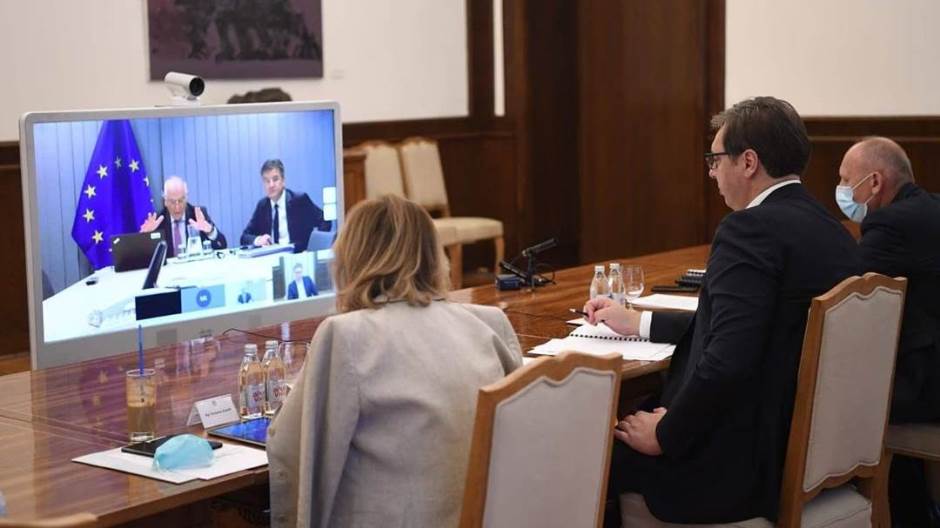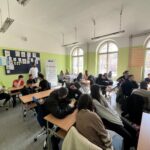Few new ideas are offered on how to overcome the current impasse. If there are any, they are advocated without much enthusiasm. One aspect of this collective resignation is that over the years a lot has been proposed only to be rejected; the other, that it is a complex issue asking for a “final comprehensive” solution addressing at least five or six major issues that are still open; and third, a kind of self-censorship: if I propose it, who will support me at such an advanced phase (since we are always “one step away” from historic breakthrough, right).
Rightfully or not, both sides have raised the issue to the one of highest national interest; “internationalized” the problem by inviting foreigners back in. Hence now the rumor about the “rebranding” of the Community/Association of Serb Majority Municipalities; will proposals come from Lajcak or Negotiators themselves? If yes, how ambitious can they be and what will be the role of Germany and France, other than providing support?
Secondly, Serbian and Kosovan positions are diametrical, so much so that they seem irreconcilable. While one side says, “recognition is out of the question”, the other claims “Ahtisaari and that’s it, no more concessions”.
Public opinion polls lead us to the conclusion that in Serbia, recognition is tantamount to betrayal, not worth considering even “in exchange” for EU membership (no such offer is on the table); while in Kosovo, an odium has been created towards the “Community/Association”. There is concern that it would be just a tool in the hands of Belgrade; make Kosovo dysfunctional for years to come, etc. etc.
Third, writing for Balkan Insight colleagues Xhambazi and Hartwell see Belgrade’s position as “monolithic” when compared to Pristina’s “disunited negotiators.” This is an interesting thesis: yes, it seems that Vučić has built a political machine that will accept what party leadership orders. However, citizens who are not members of the party also vote for him (according to the data from December 2019, the Progressives have 646,000 party members). If explicit recognition takes place, “his” electorate would be split in half (CDDRI, October 2019).
What is the desired option for official Belgrade?
Recognition has become something like a “bridge too far”, the closer we hypothetically get to it, citizens feel pressured and pulled further away from the notion. The problem is, again, multifaceted – there is the finality of the process (despite all the efforts Serbia invested in withdrawing recognitions around the globe, we know – or better, feel – that would be it), the moral strength of Kosovo “pledge” (zavet in Serbian) and the impression that something so important is being done secretly.
If fantasies about the return of Kosovo under the sovereignty of Serbia are ignored, for a decade now we have had two parallel processes – one, of relaxation and normalization, which takes place through technical agreements, and the other, the grand political “finale”, which would, from Belgrade’s point of view, ideally culminate with an international conference and Security Council’s resolution/confirmation in the General Assembly.
From many conversations with different interlocutors in Belgrade, I can say with great degree of certainty that explicit recognition of Kosovo by Serbia becomes possible only in case of territorial concessions. Under certain conditions this position may change, but that seems unlikely at the moment. Partition (not necessarily exchange of territories) in exchange for explicit recognition has for long been one of the options for Belgrade, and there is clear continuity, from Zoran Đinđić over Boris Tadić to Aleksandar Vučić, with the notable exception of Vojislav Koštunica who was Prime Minister during Vienna negotiations.
The reasons should not be sought only in Serbian nationalism (nationalist says “next year in Prizren” not “Mitrovica”), but also in the problem of lack of trust in the other side; defining national interest (what are we defending in Kosovo?); demands of European integration process and sense of impending demographic decline. It is a comparison few have made openly, but look at Serbs in Croatia 25 years after the war has ended, who today have “no potential and strength to inject fresh blood in Croatia’s society” (Vlado Vukušić writing for Jutarnji list).
Serbia’s national interest in Kosovo
Serbia’s national interest in Kosovo is arguably best presented in the “four points” plan of Tadic’s administration from 2012: autonomy for the North; finding optimal solution for monasteries south of Ibar; guarantees for Serbs living in enclaves; resolving property issues. Remaining technical agreements (i.e. cadastre, recognition of degrees) should not realistically present a problem, apart from the one on energy which has been implemented unilaterally by Kosovo. We would add that for the Serbs living in Kosovo, keeping health and education under Serbia’s management or at least such model of management where Pristina interferes as little as possible is of great importance. Enabling dual citizenship would be a welcome, humane addition as well.
If Belgrade’s position seems “monolithic” there are also liabilities. First, there is contempt and unfounded self-aggrandizement. For long Kosovo was viewed from above, considered a “protectorate” that would not exist without its international backers. Because of this, two decades of state building have been largely ignored.
At the same time, there is positive prejudice towards Albanians as fairly united and well-connected people. When Kurti said “Serbia is a strong state and a weak nation… while Kosovo is a weak state and a strong nation” it sounded like he’s been talking to a high-ranking official from Belgrade (although we would hardly today, in the mess that is response to COVID-19 pandemic, call our country strong).
Second lasting handicap of Belgrade, is that both as a democracy and an autocracy, it has failed to create a “national consensus” on Kosovo. Reasons are many: lack of agreement among coalition partners, position of the Serbian Orthodox Church, what seemed as more pressing priorities and when Vučić tried it in 2017-18, it was unclear whether he just wanted to sound off different audiences, buy time, or genuinely look for options.
What is the acceptable option?
To conclude, what does Belgrade want today? In one sentence, to end the process with something that wouldn’t resemble a national – or political – humiliation. To “get something in return” in order to “compromise”. Now that “something” has been a moving target.
Judging by the mood across many social media platforms, and, more importantly, opinion polls and focus groups, in a short period of time, Community/Association has gained a positive image. If there is no pressure for explicit recognition, a seat for Kosovo in the UN could be imagined – and as a colleague of mine had said, implicit or explicit, a seat in the UN means: game over.
It makes sense for Vučić to now pivot to the EU. In light of Thaçi’s indictment, the American initiative came to a halt. Trump’s chances for re-election are minimal. Germany and France made it clear, albeit with a year’s delay that this is a matter for Europeans. In the fall Vučić will face “3k”: COVID-19 cases, (economic) crisis and Kosovo. Hence the change in narrative: no more talk of “razgranicenje” (“territorial demarcation”) rather lament that this policy was “rejected”; and return to “let’s implement what has been agreed”.
Shortly after 5 October, one of leading politicians from the Democratic Party said, that the best solution was to immediately recognize “them” (referring to Kosovo), regulate our relations as best we could and open a new chapter in shared history. That was (part!) of the mood in post-Milošević Serbia.
In the meantime, what we have succeeded in is finding out that our interpretations of history differ. Imagine the achievement. This is why we need outsiders, sometimes to give meaning to what we do, and sometimes to “cover” for our lack of political courage and sincere will. Perhaps positions are irreconcilable. If this is the case, let the blame game begin.
First published on the web site of D4D Institute, https://d4d-ks.org/en/editorial/kosovo-serbia-dialogue-serbian-perspective/













